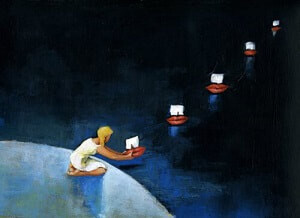Isabel Allende is one of my favourite writers. In November she was given yet another award, honoured by America's National Book Foundation for her distinguished contribution to American letters, the first such award given to a Spanish-language writer.
Allende gave an acceptance speech for her award and mentioned how being 'chronically uprooted' has inspired her creativity. Themes of 'nostalgia, loss and separation' can be found in all of her books and also define her writing process: 'As a stranger ... I observe and listen carefully. I ask questions and I question everything. For my writing, I don't need to invent much; I look around and take notes. I'm a collector of experiences.'
I kept a 'writer's notebook' for years. It went with me everywhere and I scratched down things that I saw or heard. I didn't use most of the stuff I wrote down but some I did.
When I was working as a courier in Atlanta, Georgia, I sometimes had to run out of town and up into the northern part of the state to places like Calhoun and Rome. I passed lots of billboards along the side of the country roads. One in particular stayed with me and went into my notebook: God recycles junk souls. I used it as the title of a short story.
Even though I was very young when we left the USA to move to New Zealand, I do remember some of of our life in the 60s over there: watching American Bandstand with Dick Clark on TV, rock n'roll music, going to the drive-in movies. And those memories generate some of that nostalgia Allende refers to. I wasn't 'chronically uprooted' as she was, but I was uprooted at a young age from everything I knew and all that was normal to me, put on a ship for a voyage across the Pacific, and then placed in an alien environment where even the flushing of the frightening 'thunderbox' toilet scared me to death.
This uprooting made me an observer at the age of 8. I'd always had a tendency to be shy and quiet, and when we came to New Zealand, things were so different, the children I met so unusual with their funny accents and marmite-white-bread sandwiches, I retreated. I sat, watched, said little, asked some questions, and learned how to fit in through careful observation. Of course they thought I was totally weird too with my funny accent and peanut butter and jam sandwiches.
When I return to the USA for visits, I'm hit with that sweet/sad feeling when I see something I remember from years ago: it might well be that old billboard, or the sight of our family home in Seahurst (Seattle) where we lived (the house looks different now but there's enough left to inspire memory) and walk down the street of that old neighbourhood.
The sense of nostalgia that often comes with childhood memories, of loss and separation, made more profound if that childhood had a dislocation or major change, a move from one country to another for whatever reason, can be a powerful source of emotion for our stories. Childhood memories are often fragmentary, wispy sensations lingering in the background, snippets of things said or done.
So keep a notebook. Jot them down as they come to you. Use them as the basis for your life stories.
TAGS
Nostalgia, loss and separation: be a collector of experiences
November 24, 2018
